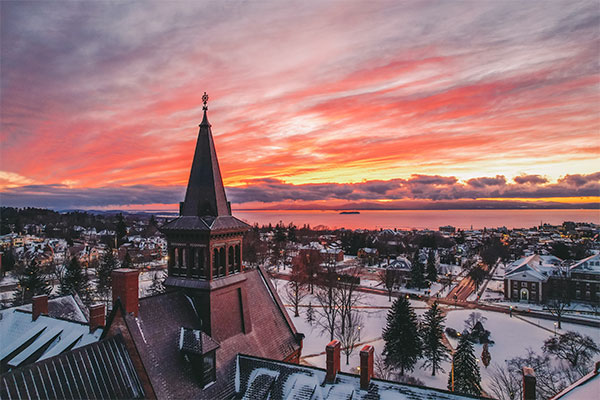“This was our zombie apocalypse house,” said Justin Will, gesturing to the two-story open floor plan home where he and his wife, Elise Willer, have unexpectedly spent the past six months.
For their entire professional lives, the two have been nomads. Justin and Elise were working in Africa when the news of the pandemic reached them in March; they knew things were going to change. They booked the last two international flights to the U.S. and arrived in Vermont, kissing the earth outside their rural home amidst the woods and farmland of Vershire.
For the first time since the couple purchased the home in 2019, they were prepared to stay long-term. Not only were they experiencing a global pandemic, they were also expecting their first child.
After graduating college, Justin enrolled in the Navy, serving stints on bases from Connecticut to Germany. In 2013, he went into the reserves to travel to Italy for a masters in coffee science. This education was the seed that sprouted his own coffee import and export business three years later, Inspire Coffee Merchants. Elise is a con-flict management consultant and trained mediator who works with organizations and companies nationally and internationally to provide training and coaching as they move through difficult situations. Prior to the pandem-ic, she frequently traveled to Africa, working in countries like Rwanda, where she had been leading a training workshop when the pandemic hit. Their work and lives meant that they traveled frequently and easily with no real home base.
“We’ve never had a good answer to the question, ‘where are you from?’,” said Elise in August, five months into their arrival to Vermont. “Now, when people ask us, it feels right to be able to say Vermont.”
When Justin and Elise purchased the unique, rural space from the architect, a friend of theirs, they had planned to continue to AirBnB the home. It had become popular on the home-sharing site for Vermonters and out-of-towners alike looking for a rural escape with little connectivity. They never anticipated they might live here given the distance from the nearest city and weak internet service. It was great for as a short-stay retreat, but it didn’t seem manageable long-term.
The pandemic changed things. Elise and Justin have both had to make working remote their new reality. In March, a happy coincidence made this easier: a fiber-optic internet cable to Vershire– a town with a population of less than a thousand– that gave them the bandwidth to work remotely from home.
“We’ve been really impressed by Vermont during this time. Our values were already aligned —pushing for com-munity, buying local,” said Elise. “And for as much as Vermonters love their state, we’ve also met so many people [since our arrival] who travel, live abroad and come back. The idea of Vermont as our homes base just feels really good.”
A place they had loved to visit, Vermont has surprised them with its diversity and strength in community. Since their arrival, Justin has been able to join via Zoom every town meeting that Vershire has held since March. They’ve also been able to source most of their groceries from small, local farmers. As Elise puts it, “Vermont is a place where you cannot only be a part of a community, but people encourage it. There’s been invitations to be a part of the community everywhere.
”There are still hurdles to overcome in order to make their Vermont base long-lasting. Sparse cell service, though sometimes appealing, can be problematic. “The nature of my job [as a business owner] is that I could be working at any moment,” says Justin. “That’s an issue when I have zero cell service and have to plan days that I’m inacces-sible when we travel to Brattleboro or other towns for necessities.”
Justin is eager to invest in the local economy and, prior to the pandemic, was on the verge of opening a coffee shop on a main street in a Southern Vermont town. If Vermont wants to hold onto the influx of millennials that have arrived due to the pandemic, he thinks it needs more accessible resources for these young professionals. “They want us to come, but these towns and regions don’t have a plan for us once we get here,” he says. “For instance, where should I open a coffee shop? Where should these new people like me put their efforts? I want this [increase in population] to have a multiplying effect. I am super excited to be here and I’m ready to keep the wave going, but where do I start?”
“We’ve never had a good answer to the question, ‘where are you from?’ But now, when people ask us, it feels right to be able to say Vermont.” -Elise
This story by the Vermont Futures Project originally appeared on https://vtfuturesproject.org/. Photos by Anna Watts.



